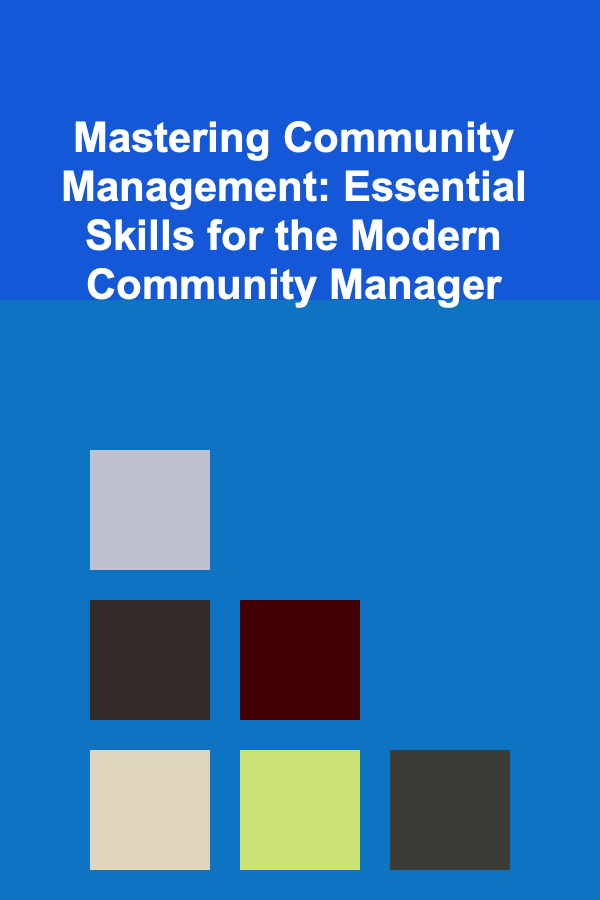
How to Embrace a Minimalist Lifestyle
ebook include PDF & Audio bundle (Micro Guide)
$12.99$10.99
Limited Time Offer! Order within the next:

In the modern world, where consumerism is deeply ingrained in our daily lives, minimalism has become more than just a trend. It is a lifestyle choice that promotes living with less in order to focus on what truly matters. Embracing a minimalist lifestyle isn't about depriving oneself; rather, it's about finding freedom, reducing clutter, and improving one's mental and physical well-being.
In this article, we will delve deep into the principles of minimalism, why it's so beneficial, and practical steps to start living a minimalist life.
What is Minimalism?
Minimalism, in its most basic sense, is the practice of living with fewer material possessions and simplifying one's life to focus on the essentials. It is about removing excess from one's surroundings and mind to create space for the things that truly bring value. The goal is not to have as little as possible, but to have only what serves a meaningful purpose, which leads to greater clarity, peace of mind, and a deeper connection with life.
Minimalism is not confined to physical possessions alone. It also applies to mental clutter, time management, and even relationships. It's about making room for the things that align with one's core values and purpose.
The Philosophy Behind Minimalism
The minimalist philosophy is rooted in the idea that we often accumulate more than we need---whether it's material possessions, obligations, or distractions. This overabundance tends to create a sense of overwhelm and chaos in our lives. Minimalism challenges this consumer-driven culture and encourages us to assess what truly adds value to our lives.
Minimalism also draws inspiration from various philosophical traditions, including Stoicism, Zen Buddhism, and even the modern digital detox movement. These philosophies emphasize the importance of living simply, with mindfulness and intentionality. The essence of minimalism is to live with purpose, making intentional choices about how we spend our time, energy, and resources.
The Benefits of Embracing Minimalism
Adopting a minimalist lifestyle can bring a variety of benefits, both tangible and intangible. Here are some of the key advantages of living with less:
1. Less Stress and Anxiety
The clutter that surrounds us---whether physical or mental---can create a sense of stress and overwhelm. Having too many possessions or obligations can lead to anxiety as we constantly manage and deal with them. Minimalism encourages the removal of excess, which can lead to a cleaner, more organized environment and a calmer, more focused mind.
2. Increased Financial Freedom
Living a minimalist lifestyle often leads to financial freedom. By focusing on what truly matters, individuals tend to make more intentional purchasing decisions, avoiding impulse buys or unnecessary expenditures. This can lead to fewer debts and greater savings, giving people the ability to prioritize their financial goals, such as travel, investing, or saving for the future.
3. More Time for What Matters
By eliminating unnecessary tasks and possessions, minimalists often find they have more time to devote to what truly matters. This could include spending time with family, pursuing hobbies, or engaging in meaningful work. Minimalism creates space for people to focus on their passions and goals, leading to a more fulfilling life.
4. Improved Relationships
Minimalism isn't just about decluttering physical space; it also extends to relationships. By removing toxic or unimportant relationships from one's life, individuals can make room for deeper, more meaningful connections. Prioritizing quality over quantity in friendships and family can lead to stronger, more supportive relationships.
5. Increased Environmental Awareness
Minimalism encourages conscious consumption, which has a positive impact on the environment. By buying less and choosing more sustainable options, minimalists reduce their carbon footprint and contribute to the fight against climate change. Additionally, minimalism encourages the use of quality items that last longer, reducing waste and promoting sustainability.
6. Clarity and Focus
When you eliminate the distractions of excess possessions and commitments, it's easier to focus on your personal goals and priorities. Minimalism helps you gain clarity about what is important, leading to greater productivity and satisfaction. By simplifying your surroundings, you create an environment conducive to focus and creativity.
Steps to Embrace a Minimalist Lifestyle
Embracing a minimalist lifestyle doesn't happen overnight, and it doesn't require a complete overhaul of your life. It's about making gradual changes that align with your values and goals. Here are some steps to help you get started:
1. Declutter Your Physical Space
The first and most obvious step in embracing minimalism is to declutter your living and working spaces. Start by evaluating your possessions---everything from clothes to furniture to gadgets. Ask yourself, "Do I truly need this? Does it add value to my life?"
Tips for Decluttering:
- Start small: Begin with one area of your home, like your wardrobe or kitchen. This allows you to see progress quickly and prevents feeling overwhelmed.
- Use the "one-in, one-out" rule: For every new item you bring into your life, commit to getting rid of something else.
- Sell, donate, or recycle: Instead of simply throwing items away, consider giving them a second life by selling, donating, or recycling.
- Embrace functional items: Keep only items that are useful and meaningful. If something doesn't serve a purpose or bring joy, let it go.
2. Streamline Your Schedule
A key component of minimalism is managing your time effectively. People often feel overwhelmed because they have too many commitments, activities, or social obligations. To embrace a minimalist lifestyle, you must prioritize your time and eliminate activities that don't serve your goals or bring you joy.
Tips for Time Management:
- Set priorities: Identify your most important tasks and focus on them. Learn to say no to commitments that don't align with your values.
- Create a schedule: Use tools like planners or digital calendars to keep track of your time. Scheduling your tasks can help you stay organized and avoid over-committing.
- Limit distractions: Cut down on activities like excessive social media usage or mindless browsing. These distractions take away time that could be spent on more fulfilling pursuits.
3. Simplify Your Finances
Minimalism and financial freedom go hand in hand. Living with less allows you to be more intentional about your spending, saving, and investing. The goal is to reduce financial stress and achieve greater stability by focusing on what truly matters.
Tips for Simplifying Finances:
- Create a budget: Track your expenses and identify areas where you can cut back. Avoid impulse purchases and focus on essentials.
- Avoid debt: Pay off existing debts and avoid taking on new ones. Minimalism encourages living within your means, freeing up resources for the things that matter most.
- Invest in quality over quantity: Instead of buying cheap, disposable items, invest in higher-quality products that will last longer and serve you better in the long run.
4. Cultivate Mindful Consumption
Minimalism encourages mindful consumption, meaning that you make deliberate and thoughtful choices about what you buy and consume. This applies to both physical goods and digital content. It's about avoiding mindless shopping or over-consumption, and instead focusing on quality, sustainability, and necessity.
Tips for Mindful Consumption:
- Evaluate your needs: Before purchasing something new, ask yourself if you truly need it or if it's just an impulse buy.
- Buy less, but buy better: Invest in durable, sustainable, and high-quality items that will serve you well over time.
- Limit digital consumption: Be intentional about the media you consume. Unsubscribe from unnecessary email lists, limit screen time, and curate your social media feeds to align with your interests and goals.
5. Focus on Experiences, Not Possessions
Minimalism encourages us to shift our focus from accumulating material possessions to prioritizing experiences. Research shows that experiences---such as travel, learning new skills, or spending time with loved ones---tend to bring more lasting happiness than material goods.
Tips for Prioritizing Experiences:
- Travel: Explore new places and cultures. Travel doesn't have to be expensive, and it can provide valuable memories and growth.
- Learn new skills: Pursue hobbies or activities that align with your passions. Whether it's cooking, photography, or painting, skills are a long-term investment in your happiness.
- Create memories: Spend quality time with family and friends. Experiences, such as game nights or outdoor activities, often create more meaningful connections than material gifts.
6. Let Go of Mental Clutter
Minimalism is not only about physical possessions but also about decluttering your mind. Mental clutter---such as unnecessary worries, negative thoughts, or distractions---can hinder your ability to focus and enjoy life.
Tips for Mental Clarity:
- Practice mindfulness: Engage in practices like meditation or deep breathing to calm the mind and stay present in the moment.
- Simplify your thoughts: Focus on what's important and let go of unnecessary worries or stressors.
- Journal your thoughts: Writing down your feelings can help you process and declutter your mind.
Conclusion
Embracing a minimalist lifestyle is not about depriving yourself; it's about making intentional decisions that lead to a simpler, more meaningful life. By decluttering your physical space, streamlining your time, simplifying your finances, and focusing on experiences, you can reduce stress, enhance your well-being, and create space for what truly matters. Minimalism is a personal journey that requires thoughtful consideration and practice, but the rewards are well worth the effort. So take small steps, be patient with yourself, and start living with intention.
Other Products

How to Build a Family Memory Jar to Celebrate Milestones
Read More
How to Keep Your Home's Air Quality Healthy with Regular Maintenance
Read More
How to Manage Finances After a Major Life Change
Read More
How to Store Extra Chairs Without Sacrificing Style
Read More
How to Use Wreaths to Decorate Your Home for Any Holiday Season
Read More